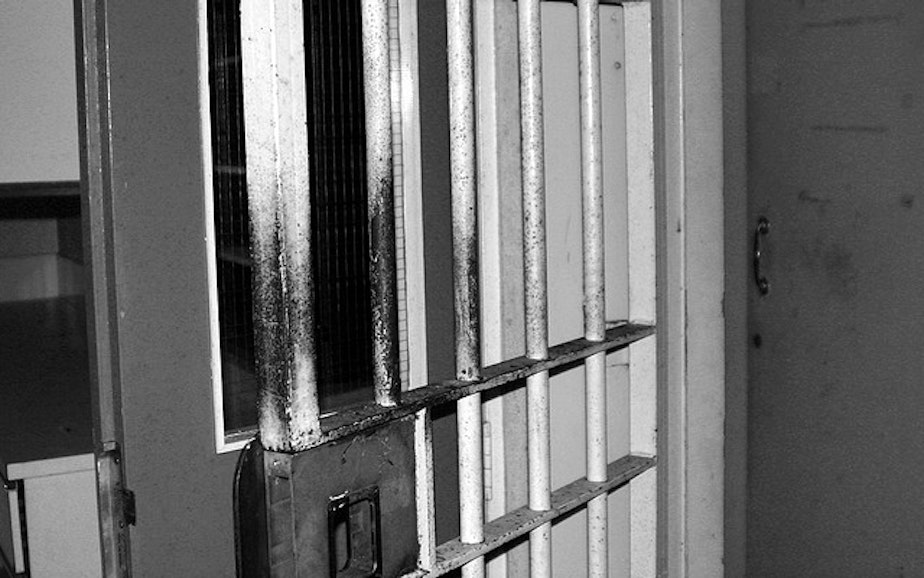Affordable Care Act Opens Door To More Inmate Enrollment

Health care enrollments so far have been focused on people without insurance. But there’s another population officials are trying to get covered – people locked up behind bars.
Since the expansion of Medicaid under the Affordable Care Act, many of the inmates will now likely qualify for Medicaid. “This really opens the door for them to get the care they need,” said Bette Pine, manager of King County’s jail health services.
In Washington, the managed care organizations that will work with Medicaid clients are not just insurance carriers administering services, said Pine. “The insurance companies themselves have caseworkers and social workers that we want to hook up with our release planners so they can be working together.”
Pine said the idea is to make sure there’s follow-through when an inmate leaves jail; it increases the likelihood of a successful transition.
Health Care After Release
Inside a bare room with concrete walls Tony, 47, recently met with Jennifer Woodard, a release planner. He had been in jail for four days for not appearing in court when he was supposed to. This isn’t Tony’s first time in jail. He’s cycled through the system more than 20 times, mainly for misdemeanor offenses like theft, burglary or failing to appear in court. We’re not disclosing his full name for privacy.
In King County, there are efforts to help inmates like Tony get access to health care after they are released.
Woodard helped him fill out a form to apply for Medicaid. With a list of medical issues – an enlarged liver, a seizure disorder and Hepatitis C – Tony said getting health coverage is important. “They can get me the medicine to help me with my condition,” he said.
Tony also has a long history of alcoholism. He’s had many periods of sobriety. Last fall he stayed sober and was able to get a job. Over the years he’s done a variety of work – laying bricks, processing fish, washing dishes. But he started drinking again and wound up back on the streets.
Tony said he wanted to get treatment for his alcohol problem, to get better so he can see his daughter again. Tony last saw her six months ago.
“She said, 'Dad, I’m not going to bring my kids around you, or my husband, or myself until you straighten up,'” he said. “You know how that made me feel? I feel like dirt. That’s my daughter, my flesh and blood. I want to break down and cry, but I thought well, maybe she’s right.”
Before he got sent back to his cell, Tony asked Woodard to let his attorney know that he wants to get into treatment. “We’re working on it,” she answered. “It’s not guaranteed because we don’t have a bed date because we can’t do that until we have a release date. But we can let her know what your goals are, what you’d like to see happen and what we’ve done so far.”
Tony got what he hoped for. Since his meeting with Woodard, a judge suspended his sentence so he could start alcohol treatment at a residential facility. He remains in jail until a bed becomes available.
Medicaid Expansion For Inmates
The jail is full of people like Tony who have complicated medical, behavioral and substance abuse issues.
Woodard said most of them don’t have health coverage so jail is one the few places where they get attention for their conditions. “Maybe they’re schizoaffective; they weren’t on meds when they came in,” she said. “But they’re on meds now, we’ve got them stabilized, they’re seeing our psychiatrist in custody, they’re doing pretty well. They’re stable.”
Woodard said signing them up for health care helps ensure that they’ll remain stable when they leave jail. If they don’t, she says, and they go off their meds, or not able to get the treatment they need, the likelihood of them coming back to jail is pretty high.
King County is not alone in getting inmates signed up for coverage. Around the country, corrections departments see the new expansion as an opportunity to connect inmates with the services they need.
It’s too early to say what effect Medicaid expansion will have on costs and whether it does provide the kind of intervention that planners envision.
That’s another reason why Medicaid is getting a lot of attention in counties and courts; according to a recent Pew study, the cost of inmate health care has risen in 42 of 44 states. Washington’s own correctional health care spending nearly doubled during the last decade.

